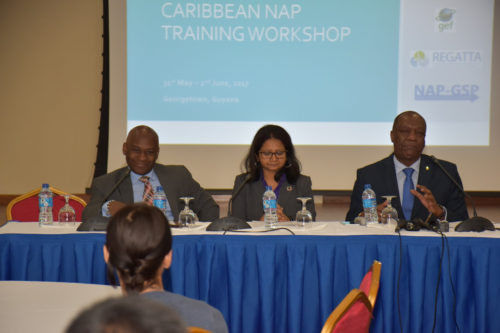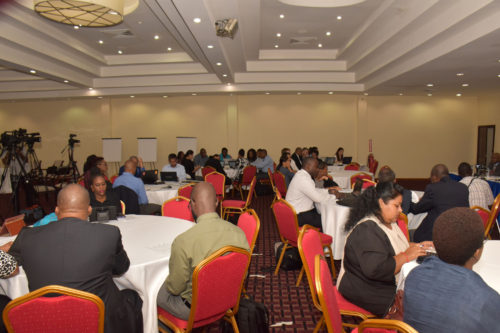Minister of State, Joseph Harmon yesterday said that even as climate change is addressed at the national level, communities must also be equipped with the necessary tools, training and knowledge since this is where the effects are most felt.
The Minister was at the time delivering the feature address at the opening ceremony of the United Nations Environment (UN Environment) Regional Capacity Building Workshop on Supporting Countries to advance their National Adaptation Plan (NAP). It was held at the Ramada Princess Hotel.
Harmon’s remarks come in the wake of flash floods in Regions Seven and Eight last week which submerged houses and decimated farms.

Harmon, while delivering an address to Permanent Secretaries from the various Ministries and representatives from Climate Change-focused-agencies from the Caribbean said, “We must ensure that we integrate climate risks and adaptation measures not only in development plans for our economic sectors, but also facilitate decentralisation from national to our regional and community level plans, for resilient communities and infrastructure.”
The Minister said that Guyana is considered particularly vulnerable to climate change.
“Due to our inherent characteristics, Guyana is regularly affected by flooding caused by heavy rainfall or overflowing riverbanks, drought on an annual basis, heavily influenced by the El Niño Southern Oscillation, and salt water intrusion for great distances in our rivers, such as the Mahaica River and the Pomeroon, influenced by tidal differences during the dry season. While most may only consider the flood risk of the coast, our hinterland region is also exposed, with the most recent flood occurring just over a week ago in Region Eight, affecting six villages and over three thousand individuals. These natural hazards are expected to increase, due to projected temperatures increase and sea level rise together with higher storm surges, based on outputs of climate models,” he stated.
To demonstrate its commitment to increasing its resilience, Harmon outlined the various actions, which have been made by the Government.

“Guyana has elaborated in its Nationally Determined Contributions to the Paris Agreement, unconditional contributions for adaptation and is undertaking the following initiatives: Mainstreaming Disaster Risk Management/Disaster Risk Reduction in the Agricultural Sector, Sea and River Defence Resilience Project, Sustainable Agriculture Development Programme, which will support strategic actions for shifting of agricultural production from the coast to the hinterland as an adaptation strategy to climate change, Improved drainage and irrigation for coastal communities and water resources management and water harvesting for hinterland communities by the Ministry of Agriculture,” he said.
The Minister also said that Permanent Secretaries were selected for this training because they are the chief planning officers at the Government Ministries, the release said.
The workshop, he said, is timely as it will offer an opportunity for knowledge exchange and capacity building.
Head of Caribbean Sub Regional Office of the United Nations Environment Programme, Vincent Sweeney, in his remarks, said that the workshop is part of the joint UNDP-UN Environment global project to support national adaptation plans.
“The objective here is to strengthen capacities for the elaboration of these plans, and in this sense, this initiative has the support and experience of the Regional Gateway for Technology Transfer and Climate Change Action in Latin America and the Caribbean (known as REGATTA). REGATTA’s main objective, as the name suggests, is to strengthen capacities, and promote and exchange knowledge on climate change technologies and experiences in the areas of mitigation and adaptation for the Latin American and Caribbean region,” he said.








